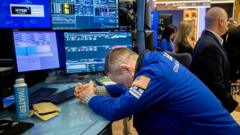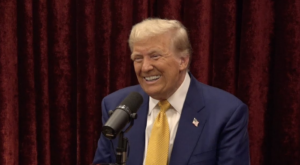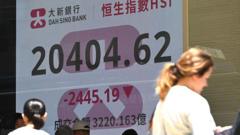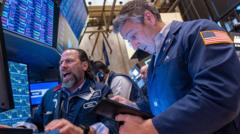The US stock market experienced erratic trading as investors grappled with President Trump's escalating tariffs on China and mixed signals regarding future negotiations, resulting in sharp losses and gains reminiscent of past market crises.
US Markets Face Turmoil Amid Rising Tariffs and Trade Tensions

US Markets Face Turmoil Amid Rising Tariffs and Trade Tensions
Investors react to President Trump's tariff threats, leading to significant fluctuations in stock markets.
The financial landscape in the United States has been dominated by volatility as investors navigated a tumultuous day of trading marked by President Donald Trump's escalating tariff threats against China. The S&P 500, a key indicator of market performance comprising 500 of the largest US companies, concluded the session down approximately 0.2%, following widespread swings that reflected heightened uncertainty reminiscent of the early days of the COVID-19 pandemic.
Despite these declines, there was a glimmer of optimism as Treasury Secretary Scott Bessent indicated the US was pursuing discussions with Japan and other nations regarding trade. Trump has previously stated that some tariffs may become permanent, while others could be open for negotiation. The White House's declaration that over 50 countries have engaged in trade discussions underscored the diplomatic efforts parallel to the escalating tensions.
The repercussions of Trump's tariff policies have led to significant downturns in stock prices, with the S&P 500 seeing a decrease exceeding 10% over a three-day span—levels not witnessed since the 2008 financial crisis. Investors are voicing frustration, with prominent figures in the business community openly critiquing Trump's unyielding approach.
In a bold move on Monday, Trump warned of imposing an additional 50% tariff on imports from China unless the country retracts its retaliatory actions, which would increase the total tariff rate to 104% on certain goods. The effects of these tariffs have raised concerns of an impending trade war and its potential to severely impact global economies.
Market reactions are closely tied to news changes; a rumor suggesting that the government might halt tariff implementations caused a brief surge in stock prices. Howard Silverblatt, a senior analyst at S&P Dow Jones Indices, highlighted the unusual caliber of market swings observed recently, attributing them to the ongoing uncertainty tied to trade relations.
In addition to the volatility in stock prices, European markets also struggled, with significant drops across leading indexes. The UK's FTSE 100 and other major indices fell sharply, reflecting global concerns about the ramifications of a potential trade war. Moreover, commodities like oil and copper have seen price fluctuations, complicating the economic outlook as investors remain on edge amid the ongoing tariff turbulence.





















